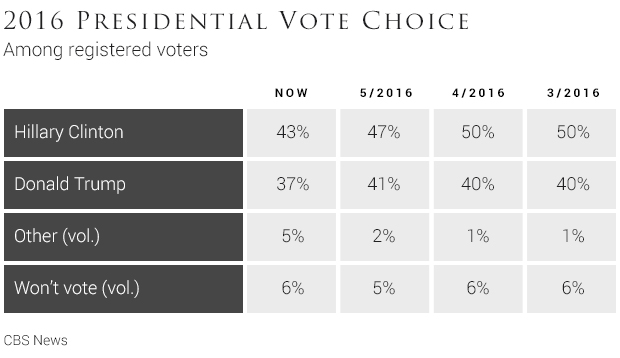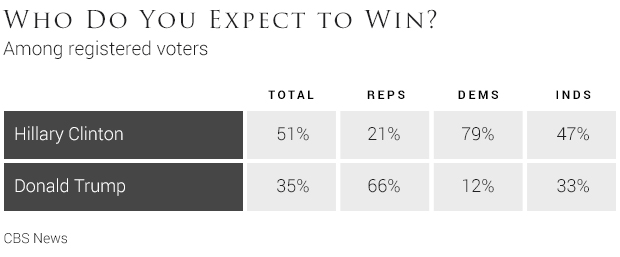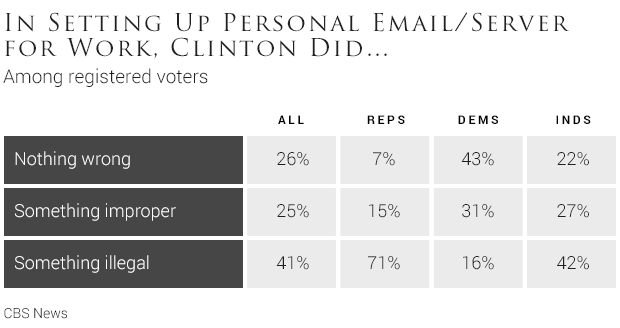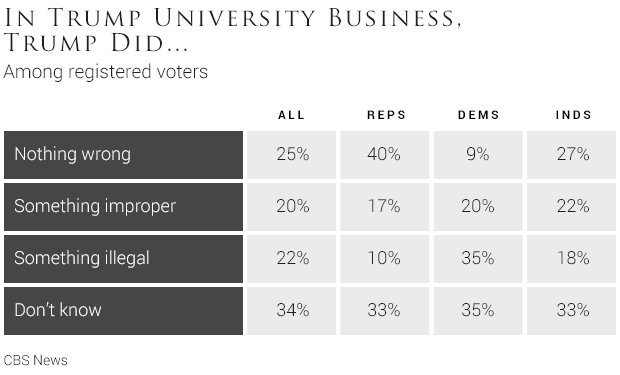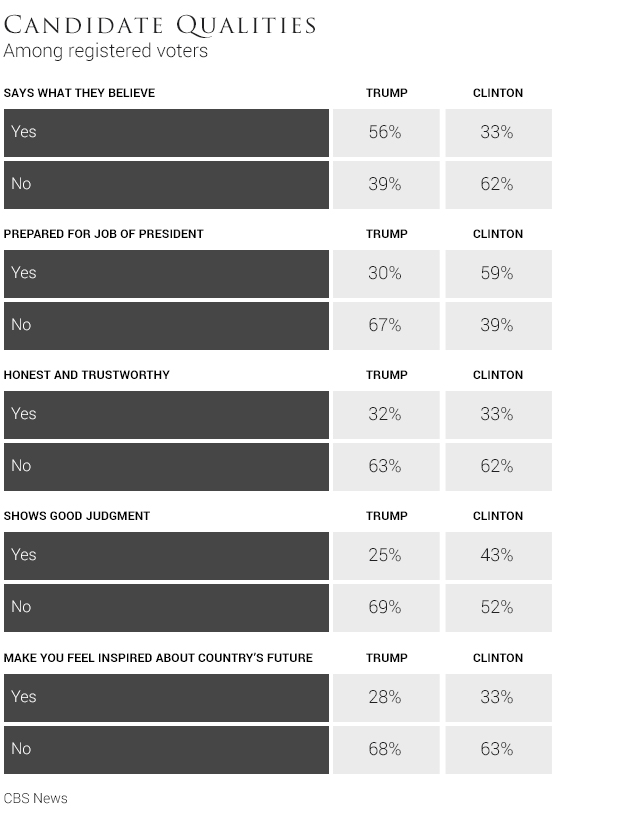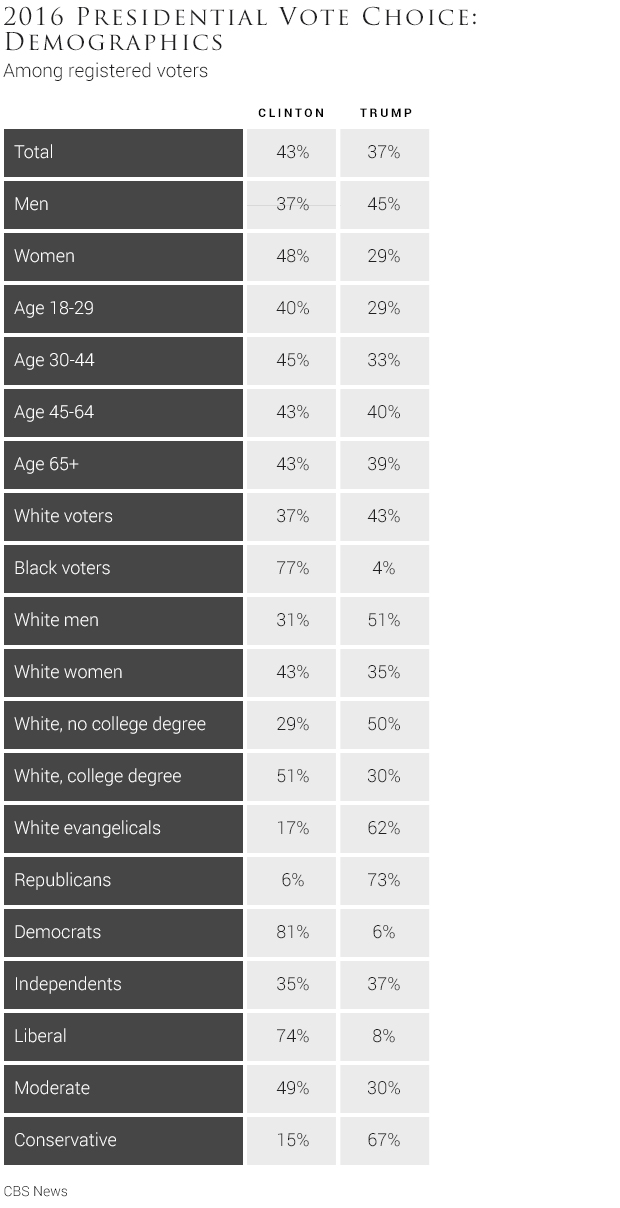Clinton maintains lead after claiming nomination - CBS News poll
By Sarah Dutton and Jennifer De Pinto, Fred Backus and Anthony Salvanto
State of the race
With the presidential primary season now officially at a close, Hillary Clinton (43 percent) holds a six-point lead over Donald Trump (37 percent) - the same margin she led Trump by a month ago. Most of the interviewing for the poll was conducted before the mass shooting in Orlando, Florida Sunday.
When former New Mexico Governor and current Libertarian candidate Gary Johnson is added to the contest, he garners 11 percent of the vote, but the margin between Clinton and Trump changes little. With Johnson's name added, Clinton holds a seven-point lead nationally over Donald Trump, 39 percent to 32 percent.
More voters expect Clinton will eventually win in November. Fifty-one percent expect Hillary Clinton to finally win the 2016 presidential election, compared to just 35 percent that expects Trump to win. Most Republicans think Trump will win, while Democrats and independents think Clinton is more likely.
Terrorism and Gun Policy
In the aftermath of the Orlando, Florida nightclub shootings, there has been considerable focus on terrorism and gun policy. Clinton (50 percent) leads Trump (43 percent) on handling terrorism and national security, while voters divide on which candidate would do a better job on gun policy -- Clinton has 46 percent support, compared to 45 percent for Trump.
Clinton's Emails
Hillary Clinton's email account and server remains an issue for her; two thirds of voters think that Clinton did something wrong when she set up a personal email address and server for work while she was Secretary of State. Forty-one percent think what she did was illegal, and another 25 percent think it was improper but not illegal. Just 26 percent of voters say she did nothing wrong.
Unsurprisingly, there are partisan differences, and Republicans are highly critical of her actions - 71 percent think what Clinton did was illegal. Among Democrats, 43 percent say she did nothing wrong, and another 31 percent said she did something improper but not illegal. Among independents, 42 percent think she broke the law.
Nearly nine in ten voters say they have heard at least something about Clinton's use of a personal email address and server, including 59 percent who say they have heard a lot about it. Among those who have heard or read a lot about this, 52 percent think Clinton's actions were illegal.
Trump University
Donald Trump is also facing some controversy over the lawsuits against Trump University and his statements about the judge handling those cases. Trump has said that the judge has a conflict of interest due to his Mexican heritage, but voters disagree. Seventy-nine percent of voters don't think the judge's heritage matters; just 14 percent see a conflict of interest.
Seven in ten voters find Trump's comments about the judge's heritage and conflict of interest offensive, including 55 percent of Republicans and 42 percent of Trump supporters. Twenty-four percent say his comments were not offensive.
Four in ten voters think Trump did something wrong regarding his Trump University business, including 22 percent who say it was illegal. Like the questions on Clinton's email, views on Trump's business practices regarding Trump University are partisan: 40 percent of Republicans think he did nothing wrong, compared to just 9 percent of Democrats. However, overall a third of voters don't know enough to have an opinion, including a third of Republicans.
Two thirds have heard or read at least something about this issue.
Still, most Republican voters (74 percent) think leaders of the Republican Party should support him even if they disagree with him on important issues, although that number has dipped slightly from 80 percent last month.
Candidate Qualities
Clinton has an advantage over Trump on handling an international crisis. Fifty-four percent of voters have at least some confidence in Clinton's ability to handle an international crisis, compared to 38 percent who say that about Trump.
Still, both of the party's presumptive nominees are viewed negatively on some key characteristics. More than six in ten don't think either Clinton or Trump is honest and trustworthy - unchanged from last month. And few voters (about a third) say these candidates make them feel inspired about the future.
Voters are also skeptical of their judgment. Sixty-nine percent of voters say Trump does not show good judgment, while fewer -- but still more than half -- say that about Clinton (52 percent).
Each candidate does have their strengths, however. Fifty-nine percent of voters say Clinton is prepared for the job of president, compared to 30 percent who think Trump is prepared. Trump is viewed as more of a straight-talker; 56 percent think Trump says what he believes, while 62 percent think Clinton mostly says what people want to hear.
Neither Trump nor Clinton is seen as a uniter by a majority of voters: 68 percent say a Trump presidency would divide Americans. Even though 41 percent think a Clinton presidency would bring groups of Americans together, more - 51 percent - think that would divide the country.
Empathy is not a particular strength for either candidate, although 45 percent of voters say Clinton understands the needs and problems of people like them, compared to 31 percent for Trump.
Looking at two other important issues facing the country, 51 percent of voters think Clinton would do a better job on illegal immigration, while 43 percent pick Trump. The candidates are even -- 47 percent each --on who would best handle the economy and jobs.
Overall views of the presumptive nominees have changed little and remain negative. The major party candidates are well-known to voters, and more than half have an unfavorable opinion of both Clinton (52 percent) and Trump (58 percent).
When compared to past likely nominees at a similar point in the election cycle, Trump and Clinton's unfavorable ratings continue to be the highest in CBS News polling going back to 1984, when the question was first asked.
2016 Presidential Vote Choice: The Demographics
Clinton continues to enjoy strong support from liberals, moderates, women, African Americans, and voters under 45, while Donald Trump gets the support of men - particularly white men - Republicans, conservatives, and white voters without a college degree.
Most registered voters say they have made up their minds about who to support: 87 percent of Trump voters and 89 percent of Clinton voters say they won't change their minds before the election. But just over a third of each candidate's supporters say they strongly favor their choice. About a quarter of both Trump and Clinton voters are supporting their candidate mainly because they dislike the opposition.
Only 32 percent of voters are very enthusiastic about the 2016 presidential election, and there is little difference between Clinton and Trump voters. Overall, enthusiasm is down from the beginning of the year: now 23 percent of voters say they are not at all enthusiastic, up from 15 percent in January before the primary season began.
Nevertheless, six in 10 voters are paying a lot of attention to the 2016 presidential campaign, and two-thirds say the campaign is interesting -- 23 percent say it is dull.
President Obama's job approval rating
At 53 percent, President Obama's job approval rating is the highest it has been since December 2012.
And evaluations of his handling of foreign policy have inched up slightly: now, 45 percent approve -- the highest since May 2013. Forty-nine percent approve of how he is handling the economy.
But just 25 percent of voters would like to see the President's policies continued, unchanged since March.
And the President's endorsement of fellow-Democrat Hillary Clinton in this year's presidential election may not do much to sway voters. 69 percent say his endorsement makes no difference, and just 13 percent say they are more likely to support her as a result.
Among Democrats, 25 percent say Obama's endorsement of Clinton makes them more likely to support her. Seventeen percent of those who supported Bernie Sanders in the Democratic primaries say the same about Obama's endorsement of Clinton.
News Media Coverage
Forty percent of voters think the news media has treated Donald Trump worse than other candidates - twice as many as say the same about the media's treatment of Clinton.
Democratic Party Unity: Clinton and Sanders
With the Democratic primaries and caucuses over, nearly two-thirds of Democratic primary voters (64 percent) think Bernie Sanders should now support Hillary Clinton for president. But those who backed Sanders in the primaries want him to fight to become the nominee at the Democratic convention in July.
A majority of Sanders voters - 57 percent - don't think the process for selecting the Democratic nominee this year was fair, though six in 10 will nevertheless support Hillary Clinton over Donald Trump in November. Just 8 percent will vote for Donald Trump.
Sanders voters appear to be happy with the idea of a Clinton-Sanders ticket. Seventy-five percent of them would like to see Clinton pick Sanders as her running mate. Registered voters overall divide on whether Clinton should choose Sanders, but 58 percent of Democratic voters like the idea. More independents support the idea than not.
Those who backed Clinton in the primaries are split --45 percent support and the same percentage oppose --on whether the presumptive nominee should put Sanders on her ticket.
A Woman for President?
Four out of five voters say the U.S. is ready to elect a woman for president, a doubling of the percentage that said so twenty years ago. Eighty-two percent of men, and 76 percent of women, agree, as do majorities of Republicans, Democrats and independents.
Seventy-two percent of voters say they hope to see a woman president in their lifetime, up from 63 percent eight years ago. Seventy-six percent of women, and two thirds of men, hope to see this happen.
This poll was conducted by telephone June 9-13, 2016 among a random sample of 1,280 adults nationwide, including 1,048 registered voters. Data collection was conducted on behalf of CBS News by SSRS of Media, PA. Phone numbers were dialed from samples of both standard land-line and cell phones.
The poll employed a random digit dial methodology. For the landline sample, a respondent was randomly selected from all adults in the household. For the cell sample, interviews were conducted with the person who answered the phone.
Interviews were conducted in English and Spanish using live interviewers.
The data have been weighted to reflect U.S. Census figures on demographic variables.
The error due to sampling for results based on the entire sample could be plus or minus three percentage points. The margin of error for the sample of registered voters is four points. The error for subgroups may be higher and is available by request. The margin of error includes the effects of standard weighting procedures which enlarge sampling error slightly.
This poll release conforms to the Standards of Disclosure of the National Council on Public Polls.
